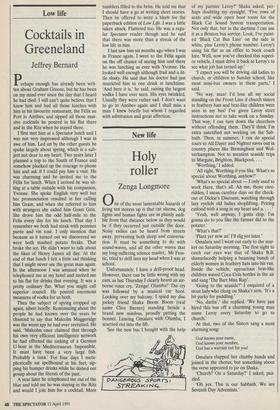Low life
Cocktails in Greeneland
Jeffrey Bernard
Perhaps enough has already been writ- ten about Graham Greene, but he has been on my mind ever since the day that I heard he had died. I still can't quite believe that I knew him and had all those lunches with him in his favourite restaurant, the Felix au Port in Antibes, and sipped all those mas- sive cocktails he poured in his flat there and in the Ritz when he stayed there.
I first met him at a Spectator lunch and I was not very impressed although I was in awe of him. Led on by the other guests he spoke largely about spying, which is a sub- ject not dear to my heart. Two years later I planned a trip to the South of France and somehow plucked up the courage to phone him and ask if I could pay him a visit. He was charming and he invited me to the Felix for lunch. When I arrived he was sit- ting at a table outside with his companion, Yvonne. She spoke English very well but her pronunciation resulted in her calling him Gram, and when she referred to him with strangers she called him Gram Grin. She drove him the odd half-mile to the Felix every day for his lunch. That day I remember we both had steak with pommes purée and yin rosé. I only mention that because as it turned out we discovered we were both mashed potato freaks. That broke the ice. He didn't want to talk about the likes of Henry James all day. At the end of that lunch I felt a little sad thinking that I might never see the great man again. In the afternoon I was amazed when he telephoned me at my hotel and invited me to his flat for drinks that evening. It was a pretty ordinary flat. What you might call superior council. He poured enormous measures of vodka for us both.
Then the subject of spying cropped up again, albeit briefly. Reminiscing about the people he had known over the years he chanced to say that Malcolm Muggeridge was the worst spy he had ever recruited. He said, 'Malcolm once claimed that through his own very efficient intelligence network he had effected the sinking of a German U-boat in the Mediterranean. Impossible. It must have been a very large fish. Probably a tuna.' For four days I meta- phorically sat spellbound at his feet, sip- ping his bumper drinks while he dished out gossip about the literati of the past.
A year later he telephoned me out of the blue and told me he was staying in the Ritz and would I join him for a cocktail. More tumblers filled to the brim. He told me that I should have a go at writing short stories. Then he offered to write a blurb for the paperback edition of Low Life. I was a little taken aback. Flattered too. He was a regu- lar Spectator reader though and he said that there was more than a streak of the low life in him.
I last saw him six months ago when I was in France again. I went to the Felix again on the off chance of seeing him and there he was lunching as ever with Yvonne. He looked well enough although frail and a lit- tle shaky. He said that his doctor had just restricted him to one drink at lunchtime. `And here it is,' he said, raising the largest vodka I have ever seen. His eyes twinkled. Usually they were rather sad. I don't want to go to Antibes again and I shall miss a man I knew briefly but whom I regarded with admiration and great affection.


























































 Previous page
Previous page